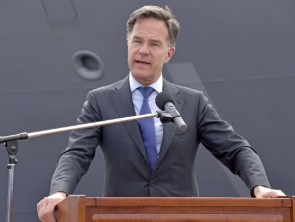On Tuesday, NATO Secretary General Mark Rutte visited Japan and shared serious concerns about China’s growing military power. Speaking at the Japanese navy port in Yokosuka, Rutte told reporters that China is quickly building up its armed forces—especially its navy—and also showing support for Russia’s ongoing war efforts.
NATO Chief Sounds the Alarm in Japan
Rutte said plainly, “China is supporting Russia’s efforts. China is rapidly increasing the size of its military, particularly its navy. We must collaborate and evaluate the situation because we cannot afford to remain naive.”
This message came during his first visit to Japan since becoming chief in October. He pointed out that NATO is closely watching China’s military activities near Taiwan. These drills, which include large-scale naval exercises, have raised alarms among many countries in the region.
China’s actions have especially worried nearby countries like Japan. Japan sees China as a growing threat and has been increasing its own military power. The Japanese government is now preparing to obtain long-range cruise missiles. This means Japan wants to be ready to strike back if attacked, something it had not focused on much in the past.
Portugal’s Powerful F-16 Jets Replace Costly Dutch F-35s in NATO Baltic Skies Realignment
Japan and NATO Are Strengthening Ties
Japan has not only worked closely with the United States but has also expanded its defense relationships with European countries and NATO. This is a big change from a few years ago when Japan mostly focused on its own national defense.
NATO, short for the North Atlantic Treaty Organization, is a military alliance mostly made up of European and North American countries. Japan is not a NATO member, but it is working closely with NATO to improve cooperation.
Rutte explained that the war in Ukraine has shown the world that threats in Europe and Asia are connected. This means if something happens in one part of the world, it can affect the other. For this reason, Japan and other Indo-Pacific nations are joining forces with NATO.
The United States has also encouraged members to be more active in the Indo-Pacific region. Recently, U.S. Secretary of Defense Pete Hegseth visited Japan to show strong American support for the Japan-U.S. alliance. Rutte welcomed this visit and said that Japan plays an important role in maintaining peace in the region, even though it’s the only member of the G7 that isn’t in NATO.
Sweden Deploys Powerful JAS-39 Gripen Fighters to Shield NATO Borders Amid Rising Russian Threats
China’s Actions Spark Global Reactions
NATO has increased its cooperation with four key Indo-Pacific partners: Japan, South Korea, Australia, and New Zealand. These four countries are often called the “IP4.” Their representatives now take part in NATO’s important meetings, including summits and gatherings of defense ministers.
China, however, is not happy about these growing ties. China has openly criticized NATO’s work with countries in Asia. Chinese officials are especially worried that the United States might try to create an alliance in the Indo-Pacific region.
While visiting Japan, NATO Secretary General Rutte planned to meet with Japan’s Defense Minister Gen Nakatani and Prime Minister Shigeru Ishiba. Ishiba has long suggested forming a strong security group in Asia, similar to NATO, although he hasn’t given full details about what that would look like.
As tensions between China and Taiwan continue to increase, NATO is becoming more involved in the Indo-Pacific region. China claims Taiwan as part of its territory and regularly conducts military exercises nearby. These drills include warships, fighter jets, and other powerful tools of war. Many countries view these actions as aggressive and dangerous.
China’s Veiled Warning to US; WZ-9 Drone Could Detect F-35 and B-21
The concern isn’t just about Taiwan. Free and open sea lanes—water routes used by ships around the world—could also be at risk if military tensions rise in the region. For this reason, Rutte stated that nations that value freedom and peace should unite and defend these vital sea lanes.
Countries with shared security goals are now forming closer partnerships as global competition grows—especially between the United States and China. The world is watching closely as these powerful nations respond to rising threats and changing alliances.
NATO’s warning about China’s military growth is a clear sign that many nations are deeply concerned about what lies ahead.

